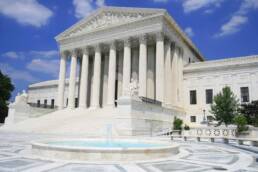The qualifications determining whether a person born abroad can acquire U.S. citizenship vary based on each situation. Derivative citizenship is governed by the Immigration and Nationality Act (INA). This can be broken up into four main categories: birth abroad in wedlock to two U.S. citizen parents; birth abroad in wedlock to a U.S. citizen and an alien; birth abroad out-of-wedlock to a U.S. citizen father; and, birth abroad out-of-wedlock to a U.S. citizen mother.
Birth Abroad in Wedlock to Two U.S. Citizen Parents
A person who is born to a U.S. citizen mother and U.S. citizen father acquires U.S. citizenship at birth, so long as one of the parents has had a residence in the U.S. prior to the person’s birth.
Birth Abroad in Wedlock to a U.S. Citizen and an Alien
A slightly different criteria applies when a person is born abroad to a U.S. citizen and foreign national who are married. The U.S. citizen parent must have physically resided in the U.S. for a certain period of time. The amount of time required is governed by statute.
Birth Abroad Out-of-Wedlock to a U.S. Citizen Father
Under the new section of the Immigration and Nationality Act, the following criteria must be met to transmit citizenship from a U.S. citizen father:
- A blood relationship between the person and the father is established by clear and convincing evidence;
- The father had the nationality of the United States at the time of the person’s birth;
- The father (unless deceased) has agreed in writing to provide financial support for the person until the person reaches the age of 18 years; and,
- While the person is under the age of 18 years old:
- the person is legitimated under the law of his/her residence or domicile,
- the father acknowledges paternity of the person in writing under oath, or
- the paternity of the person is established by adjudication of a competent court.
The father must also demonstrate that he was a U.S. citizen at the time of the person’s birth and was physically present in the United States or one of its outlying possessions for a period of five years, two after the age of 14.
Birth Abroad Out-of-Wedlock to a U.S. Citizen Mother
A person born to a U.S. citizen mother on or before June 11, 2017 can acquire U.S. citizenship if the mother was a U.S. citizen at the time of the person’s birth and if the mother was physically present in the United States or one of its outlying possessions for a continuous period of one year prior to the person’s birth. A person born abroad on or after June 12, 2017 to a U.S. citizen mother and alien father may acquire U.S. citizenship at birth if the mother was a U.S. citizen at the time of the person’s birth and was physically present in the United States or one of its outlying possessions for a period of five years, two after the age of 14. This reflects the recent change in requirements for unwed mothers, following the Supreme Court Ruling in Sessions v. Morales-Santana, holding that U.S. citizen unwed mothers needed to meet the same residency requirements as U.S. citizen unwed fathers.
When a person is born abroad to at least one U.S. citizen parent, there are certain documents that need to be obtained to demonstrate citizenship. These documents include: Consular Report of Birth Abroad document, U.S. passport and Social Security Card.
Consular Report of Birth Abroad (CRBA)
U.S. parents of children born abroad should immediately notify the U.S. Embassy or consulate of the birth and apply for a Consular Report of Birth Abroad (CRBA). The sooner the application process begins, the better. This document serves as proof of U.S. citizenship and is generally only available to children under the age of 18. Whether or not this application will be approved depends on if the child’s parent or parents meet the requirements necessary to convey derivative citizenship. Some factors include the parents’ citizenship and marital status.
If these requirements are met, parents must fill out the Application for Consular Birth Abroad. Other documents are needed as well, such as the child’s certified birth certificate from the country of birth, evidence of parents’ citizenship and identity and evidence of living in the U.S. This list is not exhaustive and varies on a case-by-case basis depending on individual circumstances. Once this application is approved, a CRBA will be issued.
U.S. Passport
For children born abroad, it is recommended that parents apply for the child’s U.S. passport at the same time as the CRBA application, since a CRBA cannot be used for travel. Additional documentation will not be necessary this way. Regardless of whether the applications are filed concurrently, parents must fill out Form D-11 to obtain a U.S passport. Parents can apply for a U.S. passport, CRBA or both. Both documents are proof of citizenship.
Proving U.S. citizenship to obtain a U.S. passport can be more difficult for adults. If a person’s birth abroad was registered, the FS-545 and DS-1350 certifications are recognized as proof of citizenship. Like a CRBA, these documents can be used to apply for a passport.
If a birth was not registered with a U.S. Embassy or consulate and one is over the age of 18, an Application for Certificate of Citizenship must be filed with USCIS. If this application is approved, USCIS will issue a Certificate of Citizenship, which can be used to apply for a passport.
Social Security Card
A Social Security Card is an additional document that can prove one’s identity. In addition to the application, at least two separate documents are needed to obtain an original Social Security Card for both adults and children. All documents presented must be originals. It is necessary to provide documentation verifying age, citizenship and identity. U.S. passports as well as CRBAs, FS-545s and DS-1350s are all acceptable and generally the easiest to provide. If the application is for a child, at least one U.S. parent must show identification as well. A U.S. passport or driver’s license are acceptable.
Anyone over the age of 12 must be present for an in-person interview to obtain a Social Security Number (SSN). This can be scheduled within the U.S. or abroad at a U.S. Embassy or consulate. Try to make an appointment at a U.S. Embassy or consulate that has a Federal Benefits Unit (FBU). This will make the process easier. However, this is not always possible. If the closest embassy or consulate does not have an FBU, it is still possible to schedule an appointment for a Social Security Card.
It is important to note that the process to obtain these documents can vary based on individual cases. Our attorneys at Berardi Immigration Law are happy to assist with any of your questions on concerns regarding naturalization!
Ready to have Berardi on your side?
Whether you’re a business looking to hire or a professional hoping to relocate, immigration law can be complicated. But you don’t have to do it alone. Put our experience to work for you.



